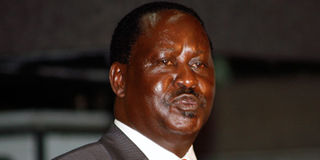Kenya PM Odinga backs December poll

Prime Minister Raila Odinga has backed a December election date saying it will suit Kenyans March 17, 2012. FILE
Prime Minister Raila Odinga has backed a December election date saying it will suit Kenyans.
In a statement, Mr Odinga said calls for elections in March 2013 were misplaced and such a move would prolong the life of Parliament beyond its current term.
The PM said all prior polls in Kenya have been held in December.
"The Prime Minister prefers December to any other date for elections because it is a date Kenyans are familiar with and used to. All elections since 1992 have been held in December," said Mr Odinga Saturday.
"Even more important, the PM feels March elections will prolong the life of the current administration and the Parliament while cutting short the life of the next by several months. This, in the PM's view, is self serving and unjustifiable."
Mr Odinga said he told the Independent Electoral and Boundaries Commission (IEBC) of his preference for a December poll during a meeting Friday evening.
The PM's argument contrasts sharply with that of President Kibaki's who is on record saying the next General Election would be held in March 2013.
Addressing Nyeri County leaders at Sagana State Lodge last week, President Kibaki said the court had ruled that elections will be held in March and he had no power to alter the date since the Judiciary is an independent arm of government.
"It is important to restate that the court ruled the elections will be held in 2013. I cannot change the date because this is the court's decision," he said.
Justice minister Mutula Kilonzo has also backed President Kibaki's views.
He said that anyone who disagrees with the March 2013 date is free to lodge an appeal in court.
“There is no confusion over when the elections should be held. As a lawyer and the minister in charge of elections, I am asking those who think that elections should not be held next year to correct me by appealing the ruling,” Mr Kilonzo said.
Mr Odinga said March elections would interfere with the school calendar since "campaigns and voting would take place in the middle of a school term".
"Elections in March would be grossly inconveniencing. They would mean campaigns and voting take place in the middle of a school term. Since schools are routinely used as polling stations, this would cause inconveniences and disruptions to learning," said the PM.
Mr Odinga also pointed out that March polls would affect farming.
The differing views of President Kibaki and Mr Odinga has put the coalition partners on a collision course.
In January, a Constitutional Court ruling to interpret the date of the first elections under the new Constitution placed the ball squarely in President Kibaki and Prime Minister Raila Odinga's court.
Justices Isaac Lenaola, David Majanja and Mumbi Ngugi, in their landmark ruling, said the General Election can only be held in 2012 if President Kibaki and Mr Odinga agree, in writing, to dissolve the Grand Coalition Government.
This would be within 60 days after the principals agree to terminate the National Accord that holds the coalition parties, PNU and ODM, together.
The other option would see Kenya go to the polls in 2013 after the expiry of the Tenth Parliament. This would be within 60 days after the House first sat on January 15, 2008.
The judges also ruled that the Independent Electoral and Boundaries Commission (IEBC) will be the body to determine the exact date.
The Constitution envisages that elections be held on the second Tuesday every fifth year, which translates to August 14, 2012.
At the same time, the Orange Democratic Movement (ODM) supported a December election saying it would be in line with the court ruling and a Cabinet decision.
ODM secretary general Anyang' Nyong'o urged the IEBC to "respect the wishes of majority Kenyans who want the elections held in December 2012" and show leadership when setting the date.
"The Kenyan people prefer that the next General Election be held in December, preferably on the 17th of December 2012 as the Cabinet had previously recommended," said Prof Nyong'o.
"The Orange Democratic Movement urges all ODM leaders, members and supporters and the general public to support this stand. The Independent Electoral and Boundaries Commission - IEBC should avoid any temptation of serving any sectarian interests through extension of the life of the coalition government by exploiting lacuna's in the law and fixing the date in March 2013," he said.
Mr Odinga's stand comes just two days after Narc Kenya leader Martha Karua criticised the Executive of seeking to illegally extend its stay in office by misinterpreting a court ruling on the elections date.
The Gichugu MP said the electoral cycle is five years and "the mandate of office holders must be renewed within the five year term to enable the new office holders to take office by the end of the term".
She said holding the elections in March would illegally extend the term of President Kibaki and that of MPs.
"Holding the elections outside the five year term would mean the President will be in office illegally. And even us parliamentarians would be paid for a term the electorate did not give us."




